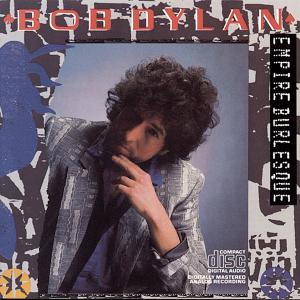
Empire Burlesque (1985)

1. Tight Conncection to My Heart
2. Seeing the Real You at Last
3. I'll Remember You
4. Clean Cut Kid
5. Never Gonna Be the Same Again
6. Trust Yourself
7. Emotionally Yours
8. When the Night Comes Falling
From the Sky
9. Something's Burning, Baby
10.Dark Eyes
Of all Dylan’s post-60s output, Empire Burlesque arguably marks the start of his most artistically troubled period—a stretch of years where inspiration seemed less a calling than a chore. Though Dylan had weathered transitional eras before, the mid-to-late 1980s posed a unique challenge. The musical zeitgeist had shifted dramatically, favoring synthetic gloss and radio-friendly bombast, and Dylan, like many of his contemporaries, appeared at odds with the new sonic vocabulary.
The result is a record that attempts to reconcile Dylan’s lyrical sensibilities with an aesthetic that never quite suits him. From the first track, the production announces itself with characteristic 1980s flamboyance: heavy-handed synthesizers, programmed drums, and an overall studio sheen that flattens whatever nuance may lie beneath. Rather than serving the songs, the production engulfs them. It is telling that even the better compositions—particularly Emotionally Yours—struggle to breathe under the weight of such arrangements.
What’s most disconcerting is not merely the sonic texture but the overall direction. Dylan had, at various times, reinvented himself with remarkable success—folk bard, electric prophet, born-again preacher—but Empire Burlesque feels less like reinvention than reluctant assimilation. One senses not an artist forging a new path, but one attempting, with some discomfort, to blend into a scene that was never his to begin with.
The presence of capable collaborators (notably members of Tom Petty’s Heartbreakers, who would later tour with Dylan) adds a layer of professional polish, but does little to rescue the material. The performances are competent, but seldom inspired. Worse still, the album cover—featuring Dylan in an ill-fitting pastel blazer against a gaudy backdrop—serves as a visual metaphor for the entire project: glossy, misjudged, and curiously hollow.
Critical reaction at the time was, surprisingly, not uniformly negative. Some saw it as a modernizing step, a necessary alignment with the decade’s demands. But with hindsight, Empire Burlesque is difficult to defend on those grounds. Unlike Bowie or Prince—artists who thrived in the synthetic terrain of the 80s—Dylan's voice and vision resist digitization. The very elements that once lent his work gravity—rawness, ambiguity, and restraint—are here obscured by layers of studio polish.
To his credit, Dylan sounds more engaged here than in some earlier misfires (notably parts of Self Portrait or Dylan), and there’s no indication that this was a careless effort. Rather, the failure is one of misalignment—of material and medium, voice and veneer. The core problem isn't that Dylan was out of ideas, but that he was drowning them in the wrong sonic language.
In sum, Empire Burlesque is a record of curious ambition and unfortunate execution. It is not without its defenders, and perhaps not without its moments. But for most listeners—then and now—it remains an artefact of an artist momentarily unmoored.
Go back to the main page
Go To Next Review